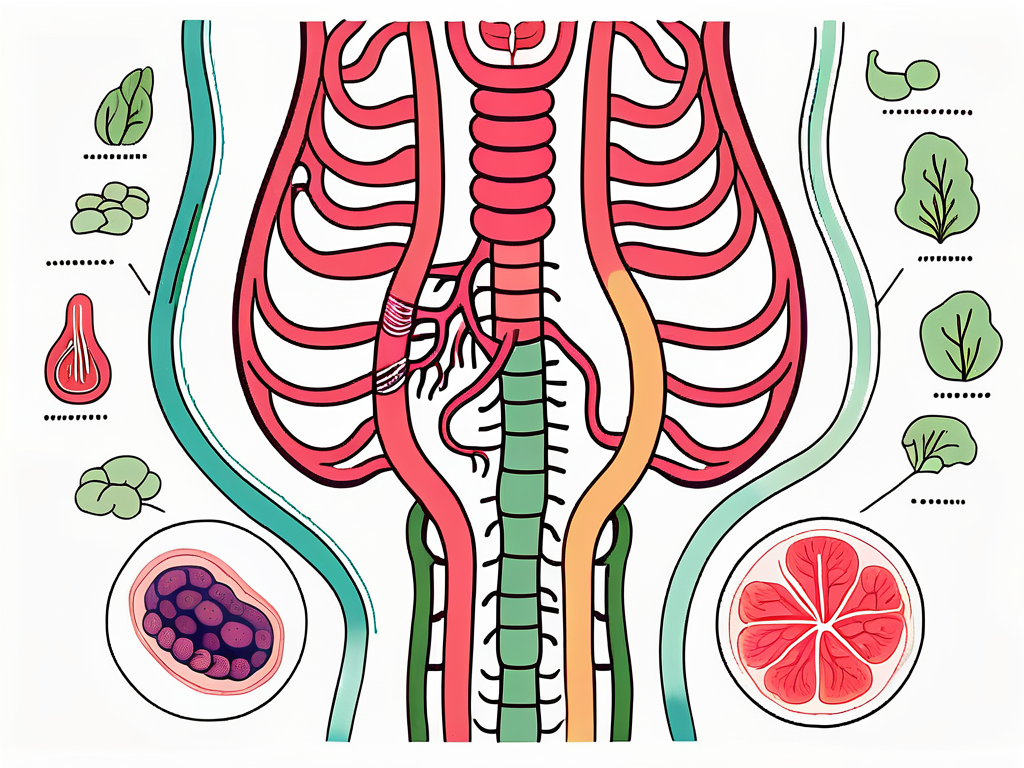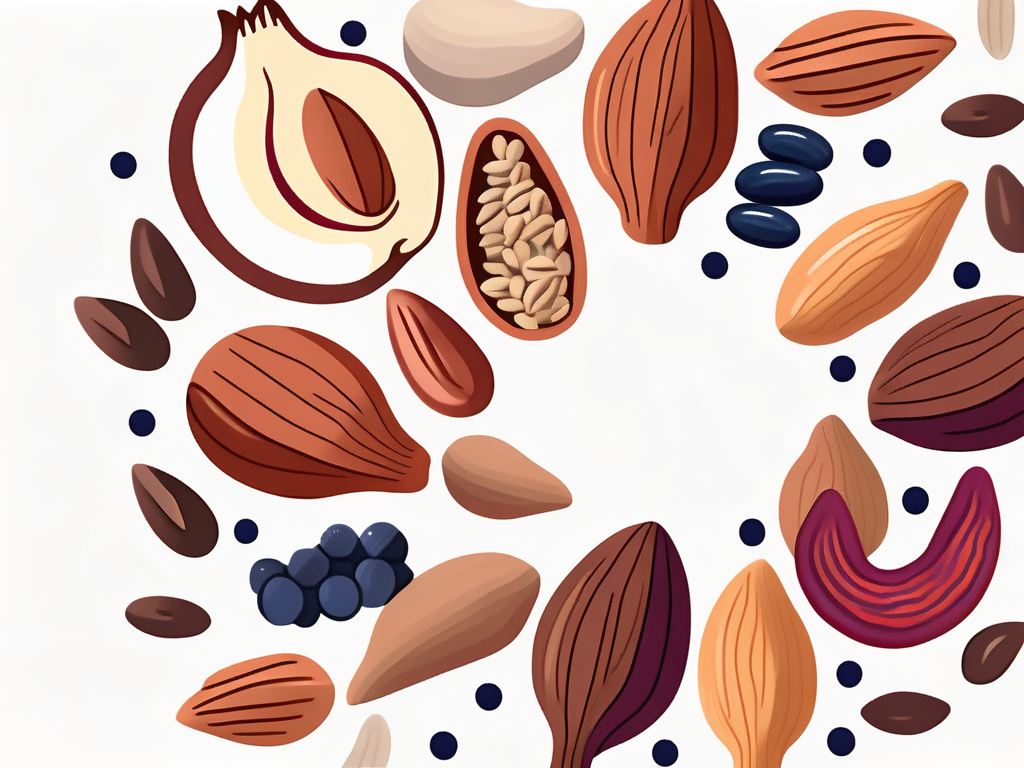Cashews are a popular nut known for their rich and creamy taste. If you are following a low FODMAP diet, you may be wondering whether cashews are safe to consume. In this article, we will explore the connection between cashews and FODMAPs, the importance of a low FODMAP diet, the nutritional profile of cashews, and alternatives to cashews that are suitable for a low FODMAP diet. We will also discuss the role of a dietitian in managing FODMAP intake and tailoring a low FODMAP diet to your needs.
Understanding FODMAP
Before we delve into the specifics of cashews and their FODMAP content, it is important to understand what FODMAPs are and why they are of concern to some individuals. FODMAP is an acronym that stands for Fermentable Oligosaccharides, Disaccharides, Monosaccharides, and Polyols. These are types of carbohydrates that can be problematic for certain people, particularly those with irritable bowel syndrome (IBS) or other digestive disorders.

What is FODMAP?
FODMAPs are short-chain carbohydrates that are poorly absorbed in the small intestine. When these carbohydrates reach the large intestine, they are fermented by bacteria, resulting in the production of gas, which can cause symptoms such as bloating, abdominal pain, and changes in bowel movements.
Importance of Low FODMAP Diet
A low FODMAP diet is often recommended for individuals with IBS or other functional gastrointestinal disorders. The goal of this diet is to reduce the intake of FODMAPs, thereby minimizing symptoms and improving overall digestive health. While not suitable for everyone, a low FODMAP diet can be an effective strategy for managing symptoms in those who are sensitive to FODMAPs.
It is essential to note that the low FODMAP diet is not meant to be a long-term solution but rather a tool to help identify specific trigger foods and alleviate symptoms. Once trigger foods have been identified, they can be gradually reintroduced to determine individual tolerance levels.
Furthermore, it is recommended that individuals embarking on a low FODMAP diet do so under the guidance of a healthcare professional or a registered dietitian. This is crucial to ensure that the diet is followed correctly and that essential nutrients are not compromised during the elimination phase.
The Nutritional Profile of Cashews
Now that we have discussed the basics of FODMAPs and their impact on digestion, let's take a closer look at the nutritional profile of cashews.
Key Nutrients in Cashews
Cashews are not only delicious but also packed with essential nutrients. They are a good source of healthy fats, protein, fiber, vitamins, and minerals. Cashews contain monounsaturated fats, which are heart-healthy fats that can help lower cholesterol levels. They also provide a moderate amount of protein, making them a satisfying snack option.
Furthermore, cashews are rich in vitamins such as vitamin E, which acts as a powerful antioxidant, protecting cells from damage caused by free radicals. Vitamin K in cashews plays a crucial role in blood clotting and bone health. The presence of B vitamins like niacin, thiamine, and B6 in cashews supports energy production, brain function, and a healthy metabolism.
Health Benefits of Cashews
In addition to their nutritional value, cashews offer several health benefits. They are rich in antioxidants, which help protect against oxidative stress and inflammation. Cashews also contain minerals such as magnesium, zinc, and copper, which are important for bone health, immune function, and energy production. Additionally, cashews have been associated with a reduced risk of heart disease and improved blood sugar control.
Moreover, the monounsaturated fats in cashews, along with their low saturated fat content, contribute to a healthy heart. The fiber content in cashews aids in digestion and promotes a feeling of fullness, which can help with weight management. The combination of nutrients in cashews makes them a versatile and nutritious addition to a balanced diet.
Cashews and FODMAPs
Now, let's address the main question: Are cashews low FODMAP?
FODMAP Content in Cashews
While cashews are generally considered low FODMAP, they do contain some FODMAPs in small amounts. The specific FODMAP present in cashews is called galactooligosaccharides (GOS), which is a type of oligosaccharide. GOS can be difficult to digest for some individuals with FODMAP sensitivities, leading to symptoms such as bloating and gas.
How Cashews Affect Digestion
It's important to note that the FODMAP content in cashews can vary depending on factors such as ripeness, processing, and individual tolerance. Some individuals may be able to tolerate small amounts of cashews without experiencing symptoms, while others may need to avoid cashews altogether. It is recommended to start with a small portion and monitor your individual response to cashews to determine if they are well-tolerated.
Furthermore, cashews are not only a source of healthy fats but also provide essential nutrients such as magnesium, copper, and vitamin K. Magnesium is crucial for muscle function and energy production, while copper plays a role in maintaining healthy skin and nerve function. Additionally, vitamin K is important for blood clotting and bone health.
Ways to Enjoy Cashews
There are various ways to incorporate cashews into your diet. You can enjoy them as a snack on their own, or use them in recipes such as cashew butter, dairy-free sauces, or vegan desserts. Roasting cashews can enhance their flavor, making them a delicious and versatile ingredient in both sweet and savory dishes.
Alternatives to Cashews in a Low FODMAP Diet
If you are following a low FODMAP diet and find that cashews trigger symptoms, there are several alternatives you can consider.

Cashews are a popular choice for snacking and cooking, but if they don't agree with your digestive system due to their FODMAP content, fear not! There are a variety of other options available that can provide similar taste and nutritional benefits.
Other Low FODMAP Nuts and Seeds
Many other nuts and seeds are considered low FODMAP and can be enjoyed as a substitute for cashews. Examples of low FODMAP nuts include almonds, macadamia nuts, and pecans. These nuts not only offer a satisfying crunch but also pack a nutritional punch with healthy fats and protein. Chia seeds, sunflower seeds, and pumpkin seeds are also low in FODMAPs and can be included in your diet to add texture and flavor to your meals.
Almonds, in particular, are a versatile nut that can be enjoyed on their own, as almond butter, or even almond flour for baking. Macadamia nuts have a rich, buttery flavor that can elevate both sweet and savory dishes. Pecans are perfect for adding a crunchy element to salads or oatmeal, providing a delicious alternative to cashews.
Incorporating Low FODMAP Foods into Your Diet
In addition to nuts and seeds, there are plenty of other low FODMAP foods that can provide similar nutritional benefits as cashews. Incorporating foods such as tofu, tempeh, quinoa, and lactose-free dairy products can help you meet your nutrient needs while following a low FODMAP diet.
Tofu and tempeh are excellent sources of plant-based protein that can be used in a variety of dishes, from stir-fries to sandwiches. Quinoa is a gluten-free whole grain that is high in protein and fiber, making it a nutritious addition to salads or as a side dish. Lactose-free dairy products like lactose-free milk or hard cheeses can be enjoyed by those with lactose intolerance, providing calcium and protein without the FODMAP content found in regular dairy products.
Consulting a Dietitian for a Low FODMAP Diet
If you are considering following a low FODMAP diet, it is advisable to consult a registered dietitian who specializes in digestive health. A dietitian can offer valuable insights and support to help you navigate the complexities of this specialized diet.

When embarking on a low FODMAP diet, it is crucial to have professional guidance to ensure that you are meeting your nutritional requirements while effectively managing your symptoms. A dietitian can play a pivotal role in this process by providing evidence-based recommendations tailored to your individual needs.
Role of a Dietitian in Managing FODMAP Intake
A dietitian can guide you in identifying high FODMAP foods and help you design an individualized meal plan that meets your specific dietary needs and preferences. They can also provide guidance on portion sizes and strategies for reintroducing FODMAP-containing foods once symptoms are under control. This personalized approach can empower you to make informed choices that support your digestive health.
Furthermore, a dietitian can offer practical tips and recipe modifications to help you navigate social situations and dining out while adhering to a low FODMAP diet. By equipping you with the necessary knowledge and skills, a dietitian can enhance your confidence in managing your dietary requirements effectively.
Tailoring a Low FODMAP Diet to Your Needs
Every individual is unique, and what works for one person may not work for another. A dietitian can work with you to tailor a low FODMAP diet to your specific needs, taking into account any other dietary restrictions or concerns you may have. By considering your medical history, lifestyle factors, and personal preferences, a dietitian can help you create a sustainable eating plan that promotes overall well-being.
In conclusion, cashews are generally considered low FODMAP but contain small amounts of FODMAPs. The impact of cashews on an individual's digestion may vary, so it is important to listen to your body and adjust your diet accordingly. Consulting a dietitian can provide personalized guidance and support on managing FODMAP intake while still enjoying a varied and nutritious diet.